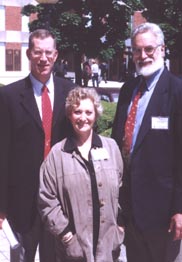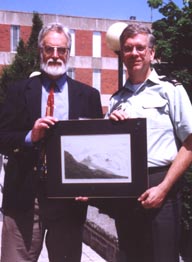JONATHAN
TALBOT / PERSONAL GLIMPSES
Activities in and out of the Studio
Participating
in a National Security Seminar at
The U.S. Army War College, Carlisle, PA
![]()
|
JT
seated at the right hand end of the first row in the picture below
(see inset). |
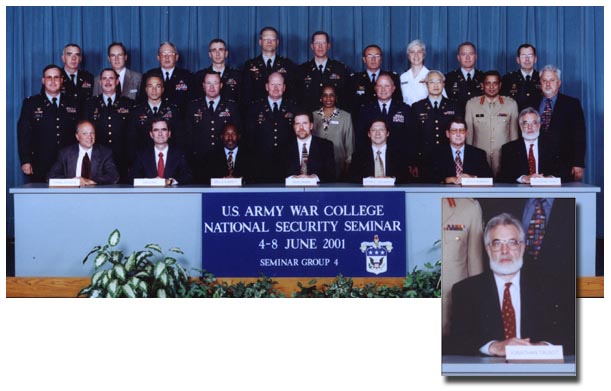 |
Part
I:
When the mail brought JT an invitation to participate in a National
Security Seminar at the U.S. Army War College in Carlisle, Pennsylvania,
he thought someone must have made a mistake. He imagined the Department
of the Army had confused him with some other "Jonathan Talbot."
He had no military experience, knew little about national security,
could not imagine what he could contribute to the dialogue or why
he had been invited. But the opportunity seemed too good to be missed.
He knew that if he attended, he would learn a lot. But he didn't imagine
how rich an experience it would be and how much he would learn. How had it happened that JT had been invited to this event? 'Though he did not know it, it had all started back in the 1978 when JT created an etching titled "Through the Pass" which pictured a biplane flying through some snow-covered mountains. Most of the signed and numbered impressions of this etching were sold to an art dealer in New York and JT promptly forgot about them. It
seems that the dealer in New York sold some of the impressions of
his etching to a dealer in Germany who was running art auctions at
U.S. Military installations in Europe. At one of those auctions a
young American officer purchased an impression of "Through the
Pass."
/////////////// . |
|
Part
II: Marsha and JT arrived in Carlisle late Sunday night. Comfortable off-campus accomodations had been arranged by the Army and, as you would expect, everything ran smoothly. Monday morning they drove the few miles to the college where they received their "orientation kits" and each guest participant met his or her individual liason officer. Theirs was Lieutenant Colonel Keith Armstrong. |
||
| Lieutenant Colonel Armstrong explained that the day would begin with a keynote speaker followed by a series of discussions. He further explained that, because of space considerations, arrangements had been made for spouses who wished to watch the proceedings (instead of venturing off on guided sightseeing trips) to do so on closed circuit TV. Marsha choose this option and JT arranged to meet her at the end of the afternoon. Then Keith took him up to the seminar group discussion room to meet the facilitator and other members of Seminar Group 4. Shortly thereafter they went to the auditorium to hear a welcome by MG R.R. Ivany, Commandant of the War College and then an address on Defense Issues by LTG K. P. Byrnes. General Byrnes remarks were followed by a question and answer period after which JT followed Lieutenant Colonel Armstrong back to the seminar group discussion room where the members of Seminar Group 4 got to know each other as they candidly discussed what they had heard. |
|
|
|
This was, as it turned out, the basic format of all five days at the seminar. First All the seminar groups gathered to hear a keynote speaker and then they returned to their individual discussion rooms for a day of discussions prompted by the remarks of the keynote speaker. There were also some optional lectures right after lunch for those who wished to attend them. The keynote speakers included Lieutenant General K. P. Byrnes, The Honorable John M. Simon, Dr. R. H. Kohn, The Honorable Lawrence S. Eagleburger, and Retired General Wesley K. Clark. Happily, it turned out that as long as there were empty seats at the back of the auditorium after everyone had been seated, Marsha could hear the keynote speakers in person. On four of the five days she was able to do that. The
members of Seminar Group 4 had, with the exception of its seven guests,
been together for the entire year under the guidance of Professor Gabriel
Marcella. In addition to the sixteen "students" from the U.S.
and there were also a Colonel from France and a Brigadier General from
Bangladesh. The guests included a Federal Judge from Oklahoma, the Mayor
of a small town in Alaska, A State Government Official from the state
of Washington, two representatives of high-tech industry, a catfish
farmer from Arkansas, and JT. /////////////// |
||
|
Part
III: Since JT, like all seminar participants, agreed to abide by the Army's "non-attribution" and confidentiality policies, there is much that occurred during the week that he is not able to share. He is, however, confident that in describing the following"artful" incident, he will not be revealing any critical information about individuals or situations other than himself. |
|||
|
Seminar group leader Professor Gabriel Marcella, in order to describe the relationship of the military to the government and the people, drew on the blackboard a diagram (reproduced by JT to the immediate right) attributed to the Prussian military theoretician Carl von Clausewitz (1780-1831). |
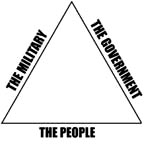 Clausewitz Diagram |
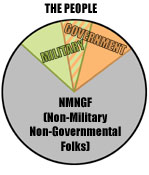 Talbot Diagram |
|
|
Clausewitz' diagram
depicted the military, the government, and the people as three separate
sides of an equilateral triangle. JT didn't like this diagram. Not only
do triangles have sharp points but, more important, the diagram did
not reflect JT's experience of the relationship between these three
entities. Almost without thinking, JT asked for an eraser and replaced
what Professor Marcella had drawn with the "pizza pie" diagram
at the far right. In JT's diagram the entire circle represents "the
people," the green area represents the military, and the orange
area represents the government. The striped area is where the military
and the government overlap. Both "the military" and "the
government" are parts of "the people." Lightheartedly,
JT chose to imitate the Army's fondness for acronyms and labeled the
rest of us "NGNMFs," or Non-Military, Non-Governmental Folks.
|
|||
| ///////////////
Excerpts from JT's notes: The members of my seminar group were intelligent, educated, and concerned men and women of good will. The military members have awesome responsibilities. Some of them feel that they are doing our nation's "dirty work" and not being respected for it. We discussed the possibility that this disrespect for the military (real or perceived) was a legacy of the Vietnam Era and my own personal belief is that it is. I expect that now though, in this post-September 11th world, they are feeling more respected. At the same time, I imagine that they are, like many of us, feeling more vulnerable. My time at the seminar has been brought into sharp focus by the events of September 11th. Some of the topics we discussed addressed the possibilities of terrorist attacks on our home ground. At the same time I was made aware that, although the military takes it orders from the executive branch of our government, congress holds the military purse-strings. My time at the Army War College has left me with great respect for the noble intentions of the brave men and women who have sworn to protect our nation. I imagine that some of my seminar-mates are now in harm's way. This saddens me. We have become citizens of "a nation at war" even though Congress has not declared war. The
seminar was marked by exceptional courtesy and genuine interest on the
part of both the hosts and the visitors. Both groups recognized that
this was a unique opportunity for social artistry and made the most
of it. /////////////// Thank you to Colonel Kevin Cunningham for inviting me to the seminar. Thank you to Colonel Keith "Stretch" Armstrong for being my "liason officer," for providing me with invaluable insights into the military, and for helping me avoid social blunders. Thank you to Major General Robert Ivany and Mrs. Ivany for their warm hospitality. Thank you to Professor Gabriel Marcella, Group 4 seminar leader, the members of Seminar Group 4, and my fellow guests for making our week together a time of deep learning. -
Jonathan Talbot,
June 17, 2002
|
|||
![]()
To reach the website of Jonathan Talbot |
click here |
For additional
information contact Jonathan Talbot at jonathan@talbot1.com
this page is located at www.talbot1.com/chronology/subpages/armywarcollege.htm and was last updated March, 2010
